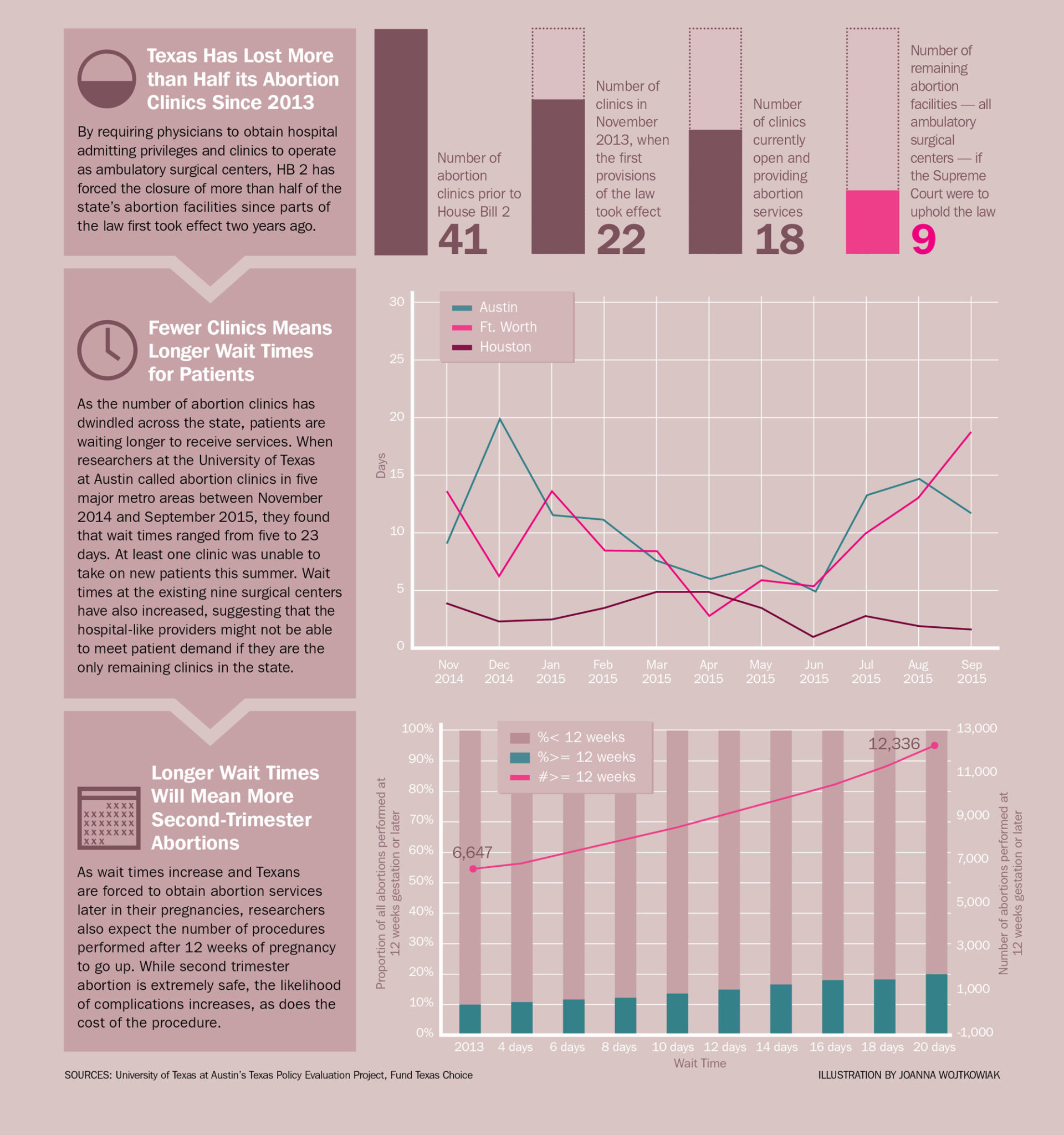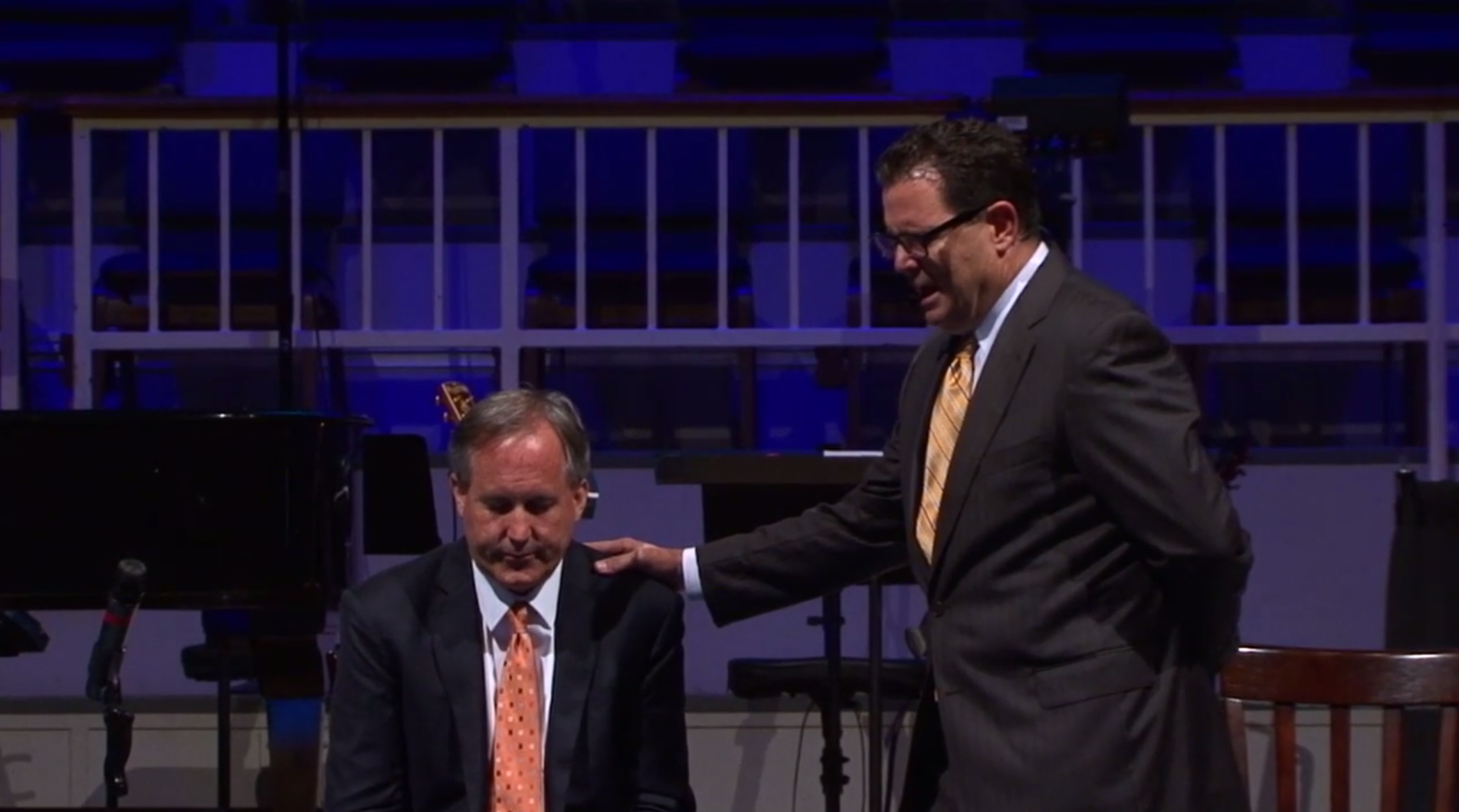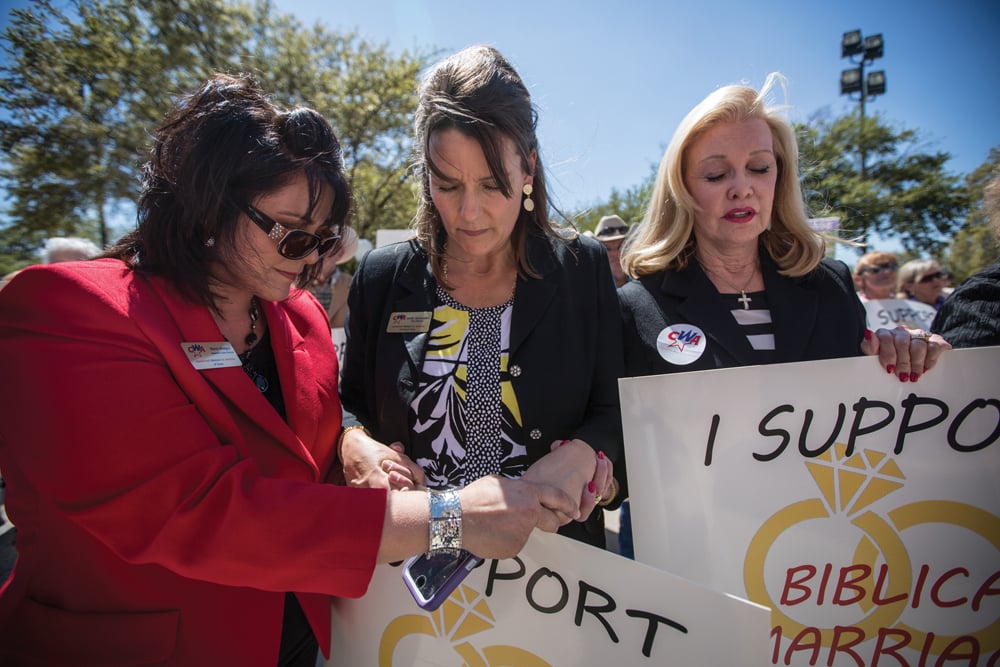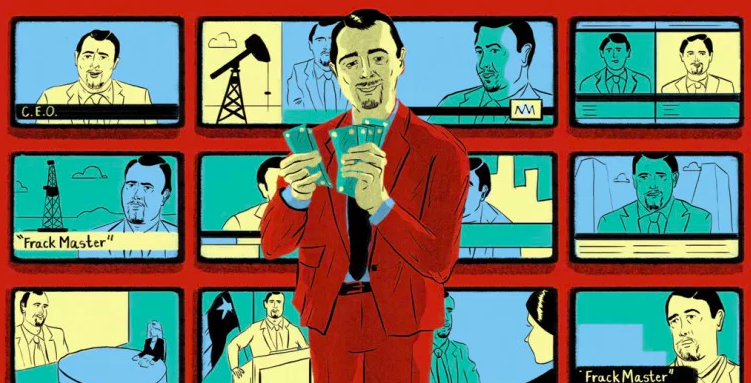
The Lite Guv and the Frack Master
Chris Faulkner brings his brand of bravado and lots of cash to the Texas Capitol. So, what's he really after?
A version of this story ran in the April 2015 issue.
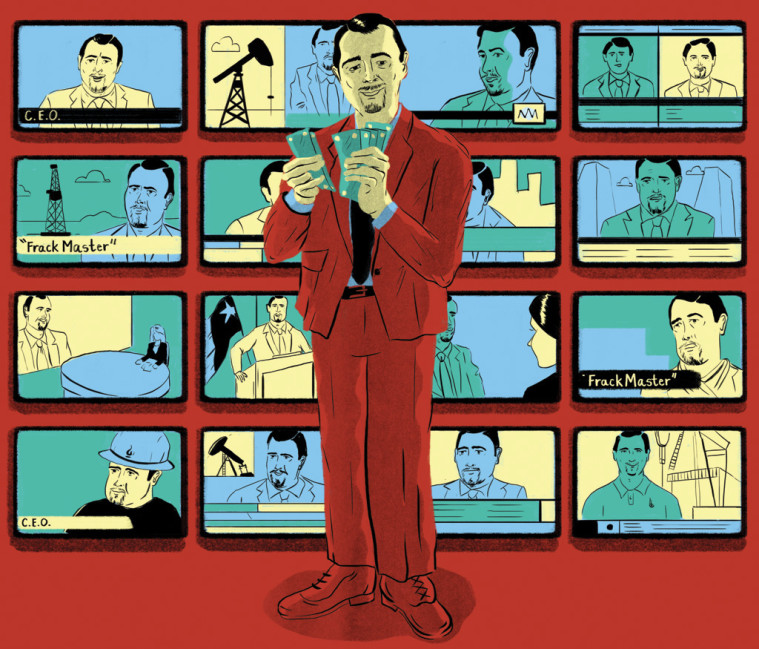
CNN International host Richard Quest strides across the studio and extends his hand to his round-faced, goateed guest. “Breitling Energy is a U.S. company that goes into fracking in a big way,” Quest says. “We have the man who’s called the ‘fracking master’ because you do so much of it.” And so continues Chris Faulkner’s seemingly endless series of TV interviews.
Faulkner is CEO of Breitling Energy Corp., and during the last three years he has become the media’s go-to voice from Texas in favor of hydraulic fracturing, also known as fracking. His 45-minute Powering America show and one-minute “Oil and Gas Today” spots were heard all last year on KRLD, the CBS radio affiliate in Dallas-Fort Worth. As Quest got almost right, Faulkner goes by the moniker “Frack Master.”
Outlets that have turned to the Frack Master for news and commentary include CNBC, Bloomberg TV and the BBC. The New York Times cited him eight times in 2014. He’s quoted by reporters for Reuters and in stories by The Associated Press.
He’s sharp and snarky with an impressive memory for facts and figures. And he’s unusual in the energy industry; while most executives dodge the press, Faulkner is happy to appear on a chat show to discuss the latest in oil prices or rig counts.
Faulkner alternates between Rush Limbaugh-style self-righteousness and sympathetic acceptance of criticism. He says people have a right to worry about noise, earthquakes and mysterious fracking fluids. But he says that fracking can be done well, and that it should be.
“These environmentalists have done a hell of a job educating folks on fear,” Faulkner said in an interview for this story. “And I think no one in this industry is willing to stand up and take that target, and I’m willing to do so.”
Faulkner is many things: tech entrepreneur, TV star, publicity genius and international fracking advocate. He also is passionate about standing up for himself in court, whether against a competitor who accused him of defamation or against a Dallas zoning board.
His first big success story was C I Host, a provider of websites and server space. The company’s value swelled with the dot-com boom of the late 1990s, but became the subject of a bitter fight for most of the 2000s. Faulkner launched C I Host before he was 25, but it wasn’t his first foray into the world of business. Before he was 18, he had built and sold a baseball card trading company and a firm that repaired video games and rented them to small businesses, he said.
While many companies distance themselves from the controversial term “fracking,” Breitling Energy embraces it. Records from the United States Patent and Trademark Office show the company has sought to trademark the names “Frack Master,” “Frackmaster” and “Frackman.” In one trademark application, Breitling seeks exclusive use of “Frackmaster” for uses including video games, comic books and “positionable toy figures.” (“At this time we’re not going to do a comic book,” Faulkner said.)
If Faulkner were just a self-promoter, he’d barely stand out from the Dallas crowd. But he’s raised his profile during the past two years by getting involved in politics. When the Denton City Council debated a municipal fracking ban, Faulkner showed up and recommended that the city regulate, rather than ban, the method.
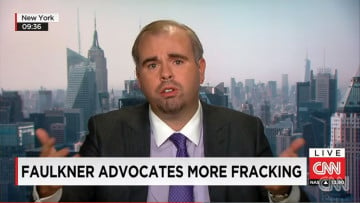
Faulkner also has become a high-dollar contributor to several statewide officials and members of the Legislature. Texas Ethics Commission records show he has given almost $300,000 to state candidates. That includes a gift of $5,000 to George P. Bush’s race for Texas Land Commissioner. His $100,000 contribution to the campaign of Railroad Commission candidate Ryan Sitton made him Sitton’s biggest individual donor. He also gave $87,500 to Dan Patrick’s campaign for lieutenant governor and a combined $65,000 to two candidates for state attorney general.
The Breitling website shows photos of U.S. Sens. John Cornyn (R-Texas) and Marco Rubio (R-Florida) at the company’s offices. Faulkner also held a reception last year for House Speaker John Boehner (R-Ohio). He donated $5,200 to U.S. Sen. Pat Roberts (R-Kansas), according to the Federal Election Commission.
The push into politics began to pay off in January. Before he was even sworn into office, Patrick, in a Jan. 15 press conference, announced an energy advisory committee to be chaired by legendary oil-and-gas man and philanthropist T. Boone Pickens. Patrick said the panel was meant to contribute a broad range of opinion, and not be just “Dan’s team.” But of the eight initial members, seven were Patrick donors. Though his name wasn’t on the original list, Breitling Energy announced a week later that Faulkner had been appointed to the panel.
Faulkner’s transition from dot-com promoter to member of a committee that has the ear of the lieutenant governor of Texas was a giant accomplishment. “That’s the pinnacle of his career,” said Thomas Miller, vice president of communications at Breitling. “That’s the highlight of everything he’s ever done. … And there’s no business that will come. He won’t make a dime off that, but just to be at that table speaks a lot to the networking.”
But Faulkner’s seat at that table was fleeting. Just two months after Breitling Energy announced on its website that Faulkner had been tapped for the post, the lieutenant governor’s office told the Observer that Faulkner had tendered his resignation. The move came after a lengthy examination by the Observer of Faulkner’s background and qualifications.
Faulkner resigned on a Friday in mid-March with no widely distributed statement from Breitling. The story behind the resignation—including whether Faulkner was properly vetted, and what the lieutenant governor knew about him prior to naming him to the committee—remains a mystery. It does, however, open a window onto how things work at the Capitol, particularly in the office of the lieutenant governor.
Buried under scores of flattering news stories, corporate press releases and websites that tout Breitling’s bright future, the Observer found another story. State and federal court records in Texas, Oklahoma and Illinois show a litany of lawsuits by angry creditors and former employees as well as a minor arrest. Additionally, and central to the question of whether Faulkner met the criteria Patrick touted for his energy committee, in a series of interviews for this story, Faulkner and his spokesman painted a more limited picture of the company’s activities than some public statements by Faulkner and the name Frack Master might imply.
The Frack Master has a short history as an oilman, but he’s been an entrepreneur for decades. Faulkner said his first business was a sports memorabilia retail store in Bedford, which he built up at age 15. (His mother, attorney Carole Faulkner, registered the name Scoreboard Sports Cards in 1990, when Chris was 13.)
“It was a big craze, collecting sports cards, baseball cards, all that,” Faulkner said. “I’d buy them at wholesale through these sports memorabilia shows that would travel around and [then I’d] sell them at the retail store.”
He went on to rent out video arcade games. Later, shortly after starting college, he founded the web-hosting company that would become C I Host. These endeavors were what Faulkner called “the successful ones,” saying he has started some 200 companies with “plenty of failures along the way.”
He started at Southern Methodist University in 1995, but his career there ended in a legal storm after just three semesters. According to documents in a lawsuit that Faulkner filed against the school, his chemistry professor claimed in an honor code complaint that Faulkner tried to boost his grade by turning in forged quizzes.
Faulkner sued the university for defamation, for false advertising (promising but not providing tenured professors), and for thwarting his plan to become a doctor. The school had cost him $10 million in lifetime earnings, he said in the suit. He demanded $69 million. Faulkner’s lawyer was his mother, Carole, who had graduated from Baylor Law School seven years earlier.
In November 1998, the court dismissed the case and said Faulkner would “take nothing from defendants.” Faulkner said in an interview that he won the case with a settlement. He declined to elaborate in response to a follow-up email. SMU General Counsel Paul Ward didn’t respond to multiple requests for comment.
By then, Faulkner already had found his passion: the emerging Internet. He registered chrisfaulkner.com and began publishing The Unit Shifter, a fan page for the band Nirvana with master-level trivia questions such as, “What was the name of the Medical Examiner who examined Kurt’s body?”
Faulkner spent a term at Baylor and a year at the University of North Texas before dropping out to focus on his web-hosting company. He started it from home, annoying his landlord by receiving thousands of bill payments every month, he told The North Texan Online in 2004.
Faulkner appears on conference programs as “Dr. Christopher Faulkner.” In an interview, he said Concordia College in California granted him an honorary degree in 2004. The database of the California Postsecondary Education Commission contains no Concordia College. A spokesman for Concordia University in Irvine, California, said it hasn’t granted Faulkner an honorary degree.
Faulkner married Tamra Freedman, whose LinkedIn profile says she is a marketing executive at Breitling Energy, in 2007 in Cabo San Lucas. Video of the big week can be found for $1.99 on iTunes as Season 3, Episode 2 of Platinum Weddings. In the show, Freedman says that the two met in 2000 and fell in love at first sight. The show notes expenses—DJs, a tequila party, a Carolina Herrera gown and gift packs—that add up to almost $290,000.
The couple has worked together on at least two commercial ventures, including BigVideos.com LLC and Porn Toys Corp., where records at the Texas Secretary of State show they were president and vice president.
By late 2005, the domains bigvideos.com and porntoys.com were registered to C I Host in Bedford. Archived versions of the websites at archive.org show that BigVideos carried the “best selection of high-quality adult DVD movies, anime, hentai, fetish and gay titles,” while Porn Toys carried a broad range of adult toys, including penis pumps.
“Chris had no day-to-day involvement,” his spokesman wrote in an emailed response to questions. “It was a profitable business, [Tamra] operated it respectfully meeting a market demand for a product that consumers buy. She made money at it, and sold it.”
During the past decade, Faulkner has made a remarkable shift from high-profile Internet entrepreneur to higher-profile Frack Master. Along the way, there’s a public record of lawsuits from creditors and former employees demanding millions of dollars. And the fracking? During a series of interviews Faulkner and his spokesman confirmed that the company has interests in hundreds of fracked wells, but that it operates very few of its own.
Faulkner recounted the origin story of C I Host in a 2003 interview with the Fort Worth Business Press. “I had 10 phone lines set up in my apartment,” he told the newspaper. “I wanted businesses to think that I had a large company, so I would use different names and pretend to be different employees of C I Host. I would say, ‘Hello, this is Joe in technical support’; ‘Hello, this is Chris in technical service’; or ‘This is Mark in sales.’ The customers didn’t even notice that the voice was the same. I was doing everything, including billing. I did this for three years and hardly ever slept.”
The Bedford-based company eventually grew to 250,000 clients, Faulkner said. But even as it became a major web host, both the company and Faulkner kept ending up in court either as plaintiff or defendant. All told, Faulkner’s Internet companies or Faulkner personally are named in dozens of lawsuits in courts in Texas, Illinois and California.
In one case, former employees at the company’s Chicago data center sued in federal court for unpaid wages. Case documents show they won a $90,000 settlement from C I Host, two other related companies and from Faulkner personally. Plaintiff Joe DePaola, reached by phone in Illinois, said the judgment was never paid. Asked about DePaola’s statement, Faulkner’s spokesman wrote in an email, “… at the time of this case, Chris was no longer involved in the company’s operations.”
“Once you become a member of that club, then many of those people become added to your business friendships. In the clean-energy world where I work, certainly a lot of the relationships between my business colleagues who have served on those boards have been particularly useful to them in making deals.”
Backbone Communications, a California telecom firm, won a judgment for more than $700,000 that was certified by a state district court in Texas against Faulkner and two companies. Backbone has never managed to seize assets, Lisa Derme, general manager of Backbone, said in an interview.
Faulkner’s spokesman downplayed the case. “Chris was the personal guarantor of a contract that C I Host canceled due to multiple service disruptions which negatively impacted C I customers, and was out of C I Hosting’s control,” Faulkner’s spokesman wrote in an emailed statement. “C I lost the case and became responsible for the entire length of the contract. They disagreed and did not pay the settlement, so it was forwarded to Chris as guarantor. He still vehemently disagrees and refused to pay. The case is over 10 years old and has no impact on him personally at this time.”
There’s also the case between Faulkner and his former driver, Bobby Lee Clemons. Clemons claimed in records in Texas state court that “On the last weekend in March of 2007, Mr. Faulkner instructed plaintiff to pick up two packages … and deliver one to his home and deliver one to Mr. Faulkner in Florida. On inspection of the package, [an illegal substance] was found to be the contents. The package was left in Mr. Faulkner’s car in Texas.” Faulker denied all of Clemons’ claims and said in an interview, “You can look at those records.”
Clemons claimed in his suit that Faulkner had given him a car to keep, but Faulkner reported the car stolen. Additionally, according to the suit, Faulkner “sent (or caused to be sent) a mass fax to the public asserting that Plaintiff was a convicted felon” wanted for “grand theft auto” and was a “fugitive.”
Clemons’ claims were never tested in court, as the sides settled in 2009. Extensive searching for Clemons, including visits to his former home in Sachse, Texas, failed to turn up contact information, and he didn’t answer a message sent to an email address that appears in case paperwork.
In a 2004 case in Tarrant County, Faulkner’s Internet company sued Erin Bullock, claiming her website Slackjawed.net posted false, defamatory material. The case was dropped a month later. Bullock, reached at home, declined to comment.
Bullock claimed in court records that she was a cofounder of C I Host. Starting in 2000, she and Faulkner traded lawsuits for more than a decade, with Bullock claiming a share of the company and Faulkner denying her claim. In court filings, she accused him of mismanagement and of engaging in a “legal and psychological blitzkrieg.” He said, “I call it a divorce. We were high school sweethearts if you will. She claimed ownership of the business that she didn’t start, and we ended up in litigation.”
Faulkner said he ends up in court a lot because he doesn’t like bullies. “I’m not one to back down from a challenge,” he said. “I stand up for what I believe in. My mom taught me that from an early age. A lot of people get pushed around. It’s unfortunate some people who get pushed around don’t have the resources to push back. I’ve been fortunate to have those resources.”
There also was the arrest. Late on the night of June 9, 2011, a police report shows, Faulkner was a passenger in a car that was stopped for doing 88 mph in a 60-mph zone in Irving. The driver was booked for DWI and Faulkner was taken to the Irving jail.
At the jail, according to the report, an officer found a baggie of white powder in Faulkner’s wallet. Faulkner was charged with public intoxication and possession of a controlled substance. He pleaded guilty to attempted possession and was given deferred adjudication, court records show. Under such a program, a suspect can serve probation without a formal finding of guilt. After two years of probation, his record was left clean.
“These environmentalists have done a hell of a job educating folks on fear. And I think no one in this industry is willing to stand up and take that target, and I’m willing to do so.”
In Faulkner’s rich paper trail through the early 2000s, one thing is conspicuously missing: fracking. In testimony to the Denton City Council, Faulkner said, “My company has done it for 10 years without incident or upset.” And in an interview about oil and gas wells, he told the BBC, “We’ve fracked a thousand of those personally.”
Oklahoma state corporate records show that Faulkner started an energy company, Southwest Energy Exploration LLC, in 2004, and in 2010 changed its name to Breitling Oil and Gas LLC. But Texas Secretary of State records show Breitling Oil and Gas Corp. was founded in Dallas in 2009. Faulkner told the Observer that he started to spend all his time working on Breitling in 2008.
Even today, Breitling is a relatively small oil company. Faulkner said the company has interests in 607 wells, most of which have been fracked. The company began to operate its own wells only at the end of 2013, and as of January 2015 had seven oil and gas wells pumping the equivalent of 600 barrels a day, he said. By comparison, EOG Resources, Texas’ biggest oil producer, pumps 239,000 barrels oil a day in Texas.
To hear Tom Smith tell it, the special something in Texas politics is cash. Smith has spent 35 years as Texas director of Public Citizen, a nonpartisan group with offices in Washington, D.C., and Austin. Public Citizen monitors the way political campaigns are financed and works to reduce corporate influence in government. In 2013, Public Citizen had a $15 million budget, according to its website, and half its donations came from individuals.
Public Citizen takes the position that fracking can contaminate drinking water supplies with cancer-causing chemicals and significantly deplete freshwater aquifers. A primer about fracking posted on Public Citizen’s website claims, “natural gas extraction poses a grave threat to families, communities and eco-systems.” And that puts Public Citizen at odds with Faulkner and other contributors to Dan Patrick’s campaign who later were named to the lieutenant governor’s energy advisory committee.
Texas law allows individuals to give virtually unlimited contributions to nonjudicial statewide elections and to legislative candidates. Candidates are required, however, to report contributions to the Texas Ethics Commission. It also is perfectly legal—in fact it is common in Texas—for a statewide officeholder to appoint a contributor to a state board, agency or commission. “Texas has a long tradition of pay-to-play politics,” Smith said.
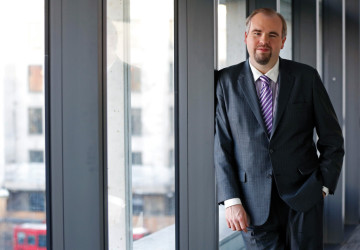
Faulkner’s 2014 giving spree, on record at the Texas Ethics Commission, was impressive: $45,000 to Railroad Commissioner Barry Smitherman; $10,000 for John Carona’s failed bid to keep his state senate seat; and $5,000 each to state Rep. James Keffer (R-Eastland) and Railroad Commissioner Christi Craddick. Ken Paxton, who defeated Smitherman for attorney general, received $30,000. Faulkner threw $6,247.50 behind state Rep. Kenneth Sheets (R-Dallas) and $1,247.53 to state Rep. Cindy Burkett (R-Sunnyvale). Representatives for Bush, Sheets and Smitherman didn’t respond to messages. Dick Clements, Carona’s treasurer, said he knew little about Faulkner except that he had donated. Keffer declined an interview, saying in an email that he doesn’t know Faulkner well.
Patrick’s campaign received $87,500 from Faulkner, according to Ethics Commission records. Nominees for most state boards, agencies and commissions are vetted by a confirmation process in the Texas Senate. Advisory boards such as the six created by Patrick are not. So, the vetting process happens privately, if at all.
At a Capitol news conference the day he announced the committee, Patrick said, “The private sector is asked for help by a candidate, but after they get elected, there’s not much follow-up. … Why would you want a legislative body to disconnect themselves from the private sector?”
Patrick said that not all of his panel members are Patrick supporters.
It may not hurt that Faulkner comes to Austin with an international reputation. He testified before a committee of the British parliament and spoke to a side event at the Council of Europe.
Faulkner’s high profile started with a barrage of press releases and reliable availability. Few oil executives discuss the news of the day on TV, so the Frack Master filled a vacuum. “He looked around and there’s nobody out there talking about this,” Breitling’s spokesman said in an interview. “He decided, ‘If nobody is, I will.’”
The results have been impressive. In late 2011, Faulkner was featured in Pipeline & Gas Journal, which included his Concordia College doctorate in its lead paragraph. In January 2012, he was quoted by Bloomberg News in a story on oil markets. From there, it was off to the races—Fox Business, NBC, ABC, CNN, CNBC, BBC.
But joining the committee may be more about networking than anything else. “Once you become a member of that club, then many of those people become added to your business friendships,” Smith, of Public Citizen, said. “In the clean-energy world where I work, certainly a lot of the relationships between my business colleagues who have served on those boards have been particularly useful to them in making deals.”
If nothing else, being on the board gives Faulkner a new legitimacy. Or rather, gave. In March, roughly six weeks after his appointment, Faulkner left the committee on the same day he responded to follow-up questions from the Observer about his past. Patrick’s office responded to a similar inquiry with a short statement.
“Until recent questions were raised, we were not aware of any issues involving Mr. Faulkner,” Keith Elkins, Patrick’s communication director, wrote in an emailed statement. “Mr. Faulkner is no longer serving on the committee. He tendered his resignation on Friday.”
“I’ve got thick skin and I love challenges. When things are going great and humming along good, I feel sometimes as CEO I have nothing to do. So when there are challenges I rise to the occasion. This is a fun time for me.”
Faulkner’s spokesman explained in a one-sentence email: “Out of respect to Dan and the other members of the committee, Chris chose to step aside because of time demands related to expansion plans at Breitling Energy and to devote time to his family.”
Leaving the commission may not have been in Faulkner’s plan, but the Frack Master is in his element dealing with adversity.
“I’ve got thick skin and I love challenges,” he said earlier during an interview. “When things are going great and humming along good, I feel sometimes as CEO I have nothing to do. So when there are challenges I rise to the occasion. This is a fun time for me.”
Despite the large public persona, Faulkner doesn’t share much of his private life. He seemed at home as he launched into a description of his company history, oil reserves and shareholder relations. But he was more circumspect speaking about his family, his personal history, even the wedding that was taped for broadcast. About being on Platinum Weddings, he said, “I don’t know if I’d call it fun, but I’d call it interesting.” Indeed, one of Faulkner’s most recent lawsuits shows his desire for privacy—he sued the Dallas Board of Adjustment for refusing to grant him permission to build a 6-and-a-half-foot fence around his home.
Asked about his plans for the future, Faulkner turned the conversation back to Breitling. “Right now I’m 100 percent focused on energy,” he said. “Right now, with what’s happening with the downturn, is we need to punch the gas, looking for acquisition targets, gaining market share. We’re not levered up. We have very little debt. So we’re in a good position to survive this downturn. It gives us an opportunity. It’s not just about weathering the storm, it’s about how we come out of this after the storm passes.”
